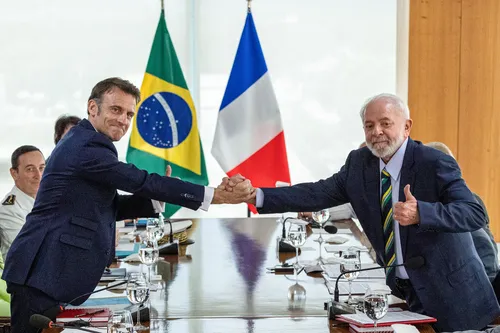
The agreement for the Amazon signed between the governments of France and Brazil during the visit of the French president, Emmanuel Macron, provides for the investment of R$5.3 billion over four years for the bioeconomy in the region, resources that should be allocated to investments in the Amazon forest in Brazilian territory and French Guiana.
Stimulating the bioeconomy is the main objective of the agreement and provides for encouraging investment in the region by private companies, explains Frenchman René Poccard Chapuis, researcher and geographer at Cirad, the European country’s research center for agriculture, which works in the Brazil since 2008.
“The bioeconomy includes a conservation economy, in dialogue with traditional peoples, which needs to be valued. The objective of this cooperation is to create an economic fabric capable of offering production chains for these Amazon products, whether they come from the forest or plantations, focused on the economy in all its dimensions.”
Cirad currently operates in the Amazon through territorial certification, a methodology to indicate to investors areas where illegal deforestation is controlled and there are indicators of progress in relation to sustainable development, which works in a similar way to the rural environmental registry (CAR) . “It aims to monitor the progress of territories, in a participatory manner, to define sustainability in that territory, how deforestation and forest degradation are being controlled and also investments in sustainable practices.”
Territorial certification is currently underway in the municipality of Paragominas (PA), in agreement with the city hall and the State Secretariat for the Environment and Sustainability (Semas) of Pará. The process, explains the researcher, is carried out through the dialogue with the Tembé people, from the Upper Guamá River Indigenous Land.
“It is a perspective of including indigenous leaders in those municipal development and environmental councils, and in platforms for thinking about territorial development. We include indigenous people to develop agricultural systems without the use of fire, because the problem they cite as the main one is the food insecurity, so we seek a scenario where they can have autonomy over food production.”
Cartography of deforestation territories
Although territorial certification targets territories where deforestation is already controlled, Cirad’s cooperation in the Amazon also provides for a diagnosis of the geographic location of persistent deforestation in the Amazon. According to Chapuis, current deforestation in the region is mainly attributed to the actions of what he classifies as the “land mafia”, which involves a small number of municipalities, which are easy to identify.
“It’s a dynamic of illegal production in general. But the main product is land, for land reasons. And we as researchers don’t have much capacity for action in the face of the mafia. It’s much more of a command and control, and inspection, job. “
This activity of the mafias, he points out, intensified until the year 2022 – a period that corresponds to the government of Jair Bolsonaro (PL) – with the encouragement of criminal activities in the region, not only mining but other illegal activities in the territories. “It was the same thing in the timber industry and in the land industry, which is what causes deforestation. There was this sign of impunity and the situation got worse. But I’m not pessimistic about the continuation of deforestation, it has already started again fall and I think Lula is doing what is necessary to reactivate all the tools that worked.”
Editing: Nicolau Soares
Source: www.brasildefato.com.br

